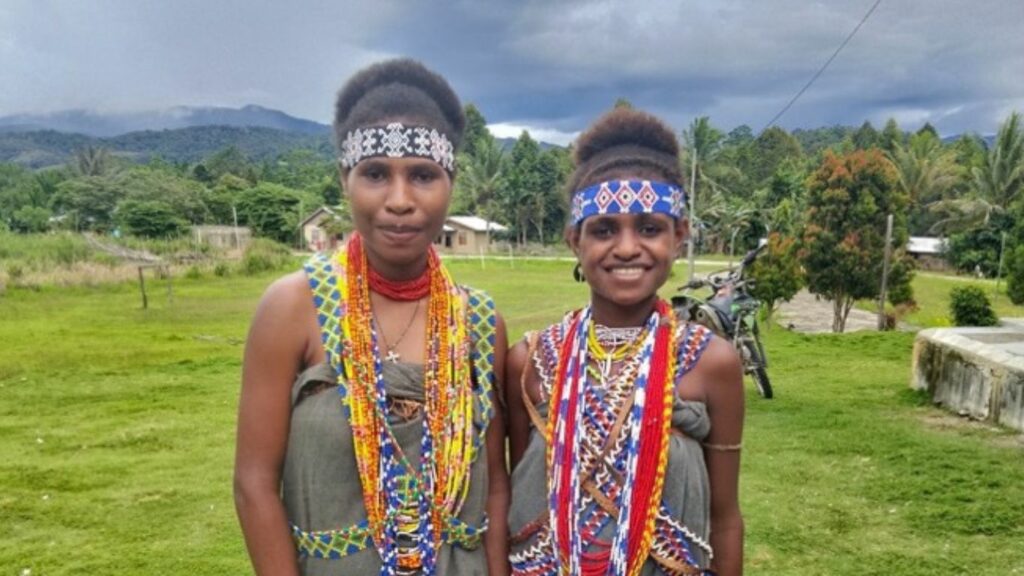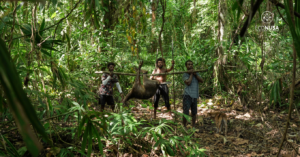
Colorful beads adorned the necks of a group of Ireres girls that afternoon. Wide smiles bloomed on their faces. They looked beautiful in complete traditional attire, along with accessories and neatly arranged hair. Occasionally, a hint of anxiety appeared on their faces, but it was all overshadowed by their cheerful laughter.
These girls are from the Ireres tribe and are undergoing the Traditional School or Coming-of-Age Ceremony for Ireres Girls. This is considered one of the most important moments for Ireres girls approaching adulthood. The Ireres tribe resides in the Ireres District, Tambrauw Regency, Southwest Papua Province. The Ireres tribe has a variety of unique cultures and customs, one of which is a tradition known as the coming-of-age ceremony for girls or commonly referred to as the traditional school for Ireres girls.
Read Also: Egek Festival: A Traditional Way of Moi Tribe in Preserving its Heritage and Nature
According to the elders, this ceremony is very important for all girls in Ireres. This tradition is conducted by parents to protect their daughters from harmful things, one of which is child marriage. As of 2023, UNICEF data shows that Indonesia ranks 8th in the world and 2nd in ASEAN for the number of child marriage cases.
With this traditional school, Ireres girls are provided with sufficient understanding and knowledge about the importance of delaying marriage until they are truly ready both physically and mentally.
Traditional Ceremony
This traditional ceremony is undertaken by girls aged 14 or after they experience their first menstruation. During the traditional school, girls are taught various Ireres cultural practices as a provision to become adult women, including various household skills they can learn as future preparations.
While undergoing this tradition, Ireres girls must wear traditional clothing complete with all the jewelry (beads) and a special rope used as bracelets on their hands or feet every day throughout the process. This tradition can last from 1 to 12 months or until the rope used breaks on its own.
Read Also: A Travel Note: Attended the Miere Tribe Traditional Council in Kaimana
The breaking of the rope signifies the end of the tradition. However, if the parents of the girls carrying out this tradition feel that their daughters are mature enough, they can remove the rope bracelets by reciting a phrase in the local language, causing the rope to break.
Taboos During Traditional School
Although they wear traditional clothing during this tradition, Ireres girls can still attend school and carry out activities as usual. However, there are several taboos they must adhere to. These include not bathing, not drinking water other than rainwater, only being allowed to eat vegetables and garden produce, and not being allowed to consume food containing flavor enhancers.
One of the Ireres girls undergoing the traditional school is Ardiana Fatemasa. She mentioned learning a lot about the culture and traditions of the Ireres tribe from her parents. “We are advised to always be cautious as women. We are taught many things as provisions for the future,” said Ardiana.
This traditional school is one of the ceremonies that is well-preserved by the Ireres tribe. Preserving traditions like the Traditional School for Ireres Girls is important as a tangible recognition of the existence of indigenous communities in Indonesia.
This tradition not only preserves the unique culture and customs of the local tribe but also provides education and protection to the younger generation. By celebrating and valuing this tradition, we participate in maintaining the identity and sustainability of indigenous communities around the world.
Editor: Friska Kalia




